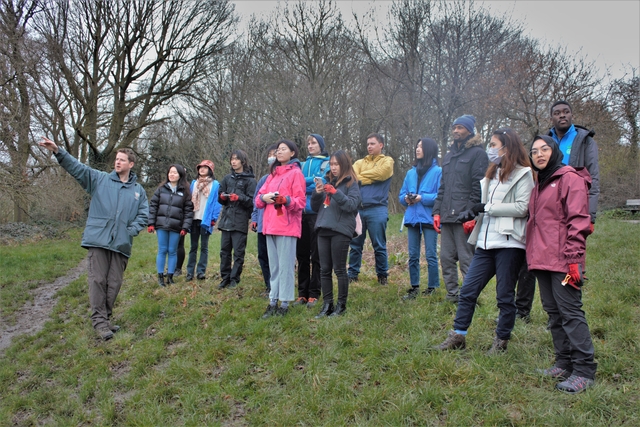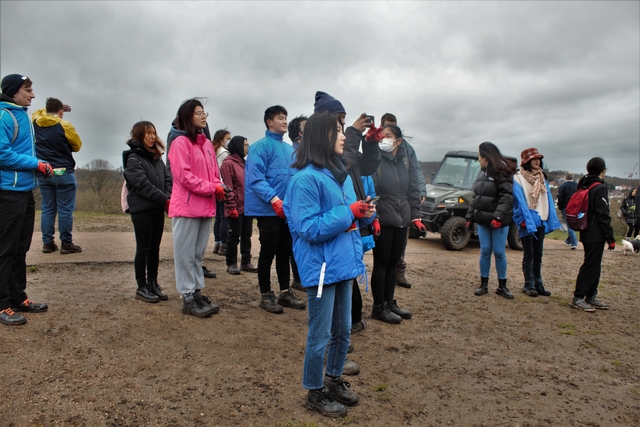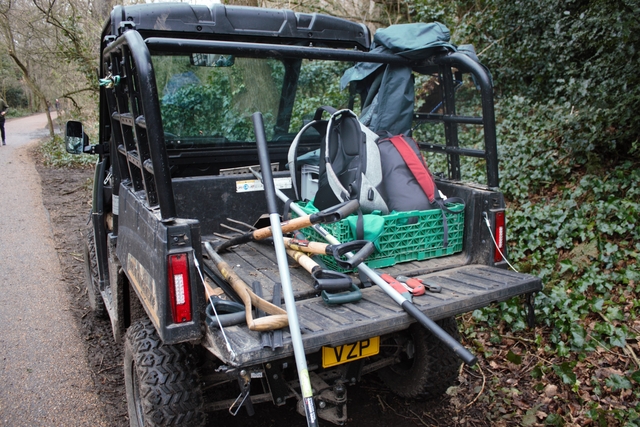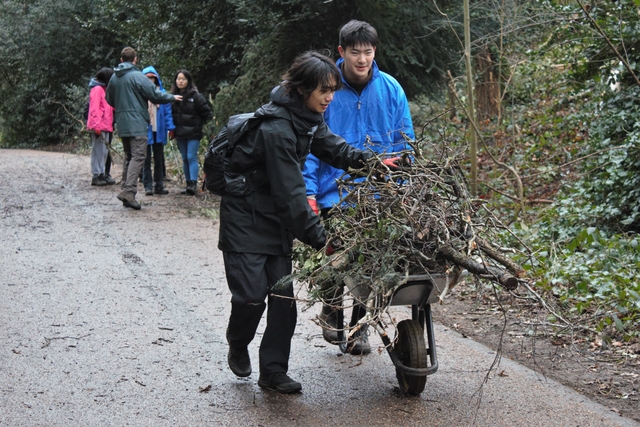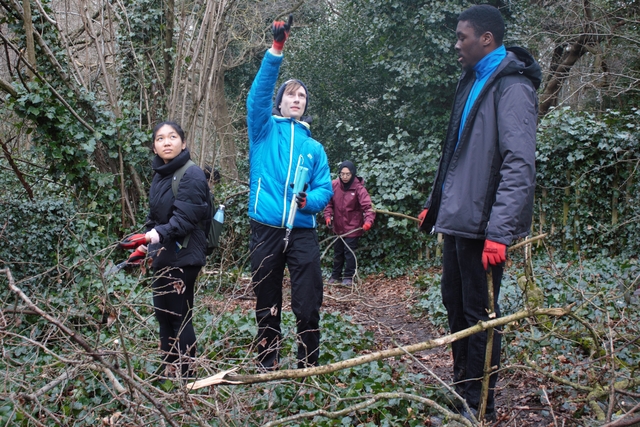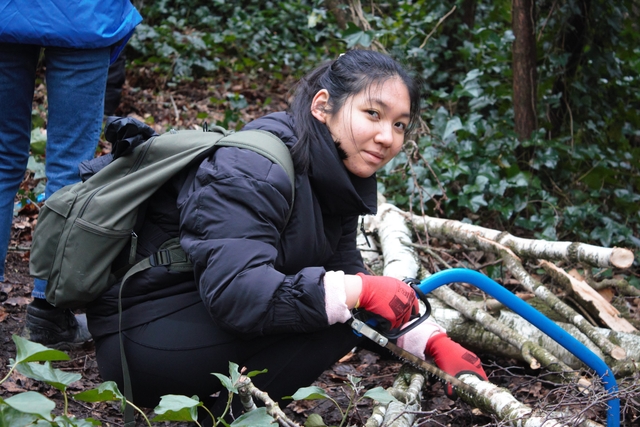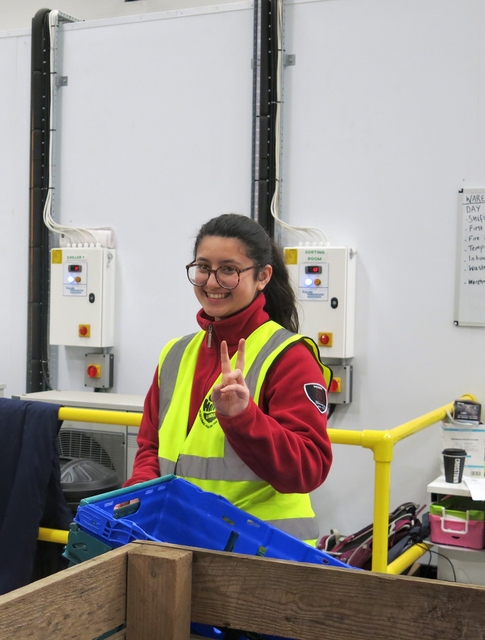Our Favourite Moments of the Year
With the end of Term 3 approaching we are getting sentimental. It's been an amazing year returning to in-person events and volunteering and we've had fantastic numbers of students getting involved. In this plenary piece we look back at one of our favourite moments of the year, the 28 Days of Sustainability campaign when two of our charity partners hosted over 40 UCL volunteers for some sustainability-centred volunteering.
28 days of Sustainability - a Volunteering Plenary.
In February and March, Sustainable UCL organised the 28 Days of Sustainability campaign to draw attention to the importance of sustainability in everyday life, and also to engage students in the process of bringing about change.
The campaign ran from the 21st of February through to the 20th of March. It was 4 weeks full of sustainability-themed lectures, workshops, and events, including 3 One-Off volunteering sessions organised by the SU's Volunteering Service! We circulated a callout to all of our Community Partners and after fierce competition, we partnered with Heath Hands and City Harvest to host over 45 UCL volunteers for some sustainability-related volunteering.
Below you can read a plenary of the One-Offs comprising of short descriptions of what volunteers have done, which sustainable causes they supported, pictures, volunteers' experiences, and exclusive interviews with Volunteer Coordinators from the two community organisations.
Heath Hands

Heath Hands is a conservation and community outreach charity, working to conserve Hampstead Heath and nearby green spaces and give people of all ages and abilities the opportunity to take part in beneficial environmental and nature-based projects.

The Heath is open to all throughout the year and Heath Hands' work varies according to the season. On 5 March, the task at hand was to repurpose trees that had fallen during storm Eunice into natural barriers. The goal of the barriers is to discourage visitors from straying from the path and destroying wildlife habitats.

During the COVID-19 Pandemic, Hampstead Heath became a go-to destination when everything else was closed and people could only go outside. Whilst grateful that Hampstead Heath was able to provide solace, the wildlife suffered detrimental consequences from the heavy footfall and sometimes poor public behaviour. It does not help that Hampstead Heath is too large to patrol every corner, and some cheeky visitors got up to trouble that further hurt the natural environment.

Barriers can be constructed using outside material, such as a fence or wire. But Colin, Hampstead Heath’s Projects and Volunteer Manager explained that when possible, they use sustainable and natural materials to maintain the natural feel of the Heath. "Hampstead Heath is not a park like Regents or Hyde Park. It is a green space and needs to be kept as natural as possible."

However, just as we should not make new additions to the green space, we also should not remove anything that belongs there either. "People tend to like things neat. We used to see trees fallen during storms and tidy them all up or remove them from the woodlands. But now we know that that's not best for a healthy ecosystem. Dead and decaying material is important for wildlife and nature and should make up around 40% of the total material."
This is where repurposing the trees felled by storm Eunice come in. By using what is already provided by nature, the volunteers could achieve the aim of the day without adding or removing anything from the space. In this project, no additional waste was created.
One of our volunteers, Madeleine Lee, describes the day as following...

"It was an early start to my Saturday morning when I got on the tube to Hampstead. After I reached the station, I embarked on a cold walk to Hampstead Heath. Despite the cold morning, I was greeted warmly by the members of Heath Hands at the entrance of a little office/educational space where they offered drinks to warm us up. Not long after that, we were given a small tour of Hampstead Heath and started our volunteering service."
"The reason I applied to this was because Hampstead Heath was always on my list of places to visit in London, so I figured what is a better way to visit the woodland when there is also an opportunity for me to volunteer in the green spaces?"

"The best thing about the event would have to be the mini guide on Hampstead Heath. With the park rangers guiding us around, I got to know a little more background on Hampstead (which I may not have gotten if I didn’t take part in this volunteering!) I also enjoyed the volunteering aspect of this opportunity because it was a great experience being able to reuse nature’s waste as a way to preserve the natural environment."
"In the future, I would definitely do more volunteering service and I am very excited for more opportunities (especially the one-off volunteering service)!"

The inside scoop from Colin, Hampstead Heath's Project Volunteer Manager.
SU Volunteering: What is your role, and how does Heath Hands contribute to sustainability?
Colin: I’m Hampstead Heath’s Projects and Volunteer Manager and with a team of five staff and 150 volunteers. We do a lot of habitat conservation, environmental and greening projects and wildlife related campaigns with the aim of enhancing the natural environment in North London. We also work in collaboration with dozens of local and London wide organisations (UCL is one!) to achieve our sustainability aims. Working in partnership is the key to sustainability!
SU Volunteering: How did you get to a career in sustainable third sector? Do you have advice for students that want to follow a similar career path?
Colin: I studied environmental related disciplines, worked in a few jobs, volunteered (rightly or wrongly it’s a huge part of our sector) for a few organisations before sort of coming back to where it all began back in Scotland working in re-wilding (transposed to North London). My two pieces of advice are to try different things but try to do the thing you enjoy. Also, if you are volunteering to gain experience, and looking at it as a steppingstone into a career – do get stuck in. It doesn’t really matter what your ability or knowledge is (these are increasingly irrelevant). It’s more about enthusiasm, having a good attitude and teamwork.

My two pieces of advice are to try different things, but try to do the thing you enjoy... if you are volunteering to gain experience, and looking at it as a steppingstone into a career – do get stuck in. It doesn’t really matter what your ability or knowledge is (these are increasingly irrelevant). It’s more about enthusiasm, having a good attitude and teamwork.
SU Volunteering: What inspires the work that you do and what do you enjoy most about your job?
Colin: People are a big factor, and being able to work outdoors while the seasons and work changes through the year.
SU Volunteering: What is the number one challenge to sustainability in the third sector at the moment?
Colin: Funding.
SU Volunteering: If you could send a message to the average person about sustainability, what would you say?
Colin: Even little changes in lifestyle and behaviour make a big difference. But we are facing a catastrophe so at some stage we will have to make hard choices about these things – better to become more sustainable now, rather than have to later.
SU Volunteering: The 5 March event was a one-off, but what other opportunities does Heath Hands have for those who would like to volunteer with them more regularly?
Colin: We have lots of UCL volunteers already here on the Heath, and there are roles advertised with your volunteering centre like our Wildlife Interpreter sessions on weekend. It’s all a bit of fun, and a chance to be outdoors in nature on a sunny (sometimes not) weekend, what could be better?
SU Volunteering: Has the Covid-19 pandemic affected your operation in any way?
Colin: Parks and green spaces were put under unprecedented pressure in terms of public behaviour and use, and we are seeing a lot of impacts on wildlife and habitats. However, they were a lifeline for many, and actually we believe people’s regard for the natural environment (given we all rely on it for survival) was enhanced during the pandemic. Hopefully everyone respects nature more as a result!
SU Volunteering: How was managing a day with UCL volunteers?
Colin: Simple. Big thanks to everyone who volunteered – you did a fantastic job of volunteering!
City Harvest

City Harvest is a food redistribution charity with a mission to ‘rescue food, people, and planet’ by diverting quality, nutritious surplus food from all over the food industry, at risk of becoming waste, , and redistributing it to those facing food poverty in London.
City Harvest has sustainability at the core of what they do:
They are tied to 9 out of the 17 UN Sustainable Development Goals, including #1 No Poverty, #2 Zero Hunger, #12 Responsible Consumption and Production, and #13 Climate Action. They support over 350 charities across London and distribute a whopping 1.000.000 meals a month. Beneficiaries include children’s programmes, food banks, refuges for women fleeing domestic violence and families fleeing war-torn countries, and local groups across London welcoming the elderly and isolated.
Tashina Weir-Grant, UCL volunteer shares her experience of the day:
"I must reiterate how awesome the day was, primarily the aim of the initiative. I was enthused with the passion that the City Harvest team has for the charity work they do - it was evident from just the way they spoke about the aim of the charity. It was also a proud moment for me just to be able to see the possible impact of my 4 hours of volunteering. The City Harvest team was able to help me better understand and appreciate how helping to sort, store or pack food helped to save it from being wasted and hence benefiting those who need it."
"It was a good experience to know that even though we are working behind the scenes, we are able to touch the lives of others in a meaningful way. This opportunity really made me feel good about doing something meaningful, especially knowing that I was able to serve others."
"One of the best moments was meeting other students from UCL and working as a team. Having lunch and just chatting with students I never knew before was a refreshing feeling."
"Thank you for the opportunity, and I will certainly assist whenever there are other one-off opportunities."
It was also a proud moment for me just to be able to see the possible impact of my 4 hours of volunteering. [...] It was a good experience to know that even though we are working behind the scenes, we are able to touch the lives of others in a meaningful way.
Tanisha

[Above figures as at April 2022]
Another Volunteer, Martha Neugarten echoed Tanisha's sentiment: "Volunteering at City Harvest was a great experience for me, both because of the people I was able to help by volunteering for an afternoon, and because of the people I met and worked with there. I’m graduating this year and looking to work in the sustainability sector, so I applied to volunteer as the impact that City Harvest has on the environment and the people they help is the kind of impact I want my career to have. Aside from knowing I was doing something good, putting together boxes of vegetables was super therapeutic and a nice break from work - I’d definitely be interested in doing more volunteering there in the future!"
I’m graduating this year and looking to work in the sustainability sector, so applied to volunteer as the impact that City Harvest has on the environment and the people they help is the kind of impact I want my career to have
Martha
Spread across two days on the 2nd and 16th of March, around 30 UCL Volunteers made their way to Acton, to City Harvest's main warehouse where they collect, store, sort, and redistribute access food. The days were filled with laughter, great conversations about sustainability, as well as satisfying physical work and well-deserved breaks spent in good company. After a brief safety training volunteers were divided into groups and given a task:
They either constructed boxes full of all that the heart desires from fusilli pasta to taco shells and delicious cooking sauces...

...or started sorting through one of the many bottomless crates of veggies and fruits, looking for food that could be saved.
Then, Volunteers were invited for lunch for the noble cause of further reducing food waste by feasting on the delicious meals offered by the donors of City Harvest. Various vegan meals were consumed in the breakroom where City Harvest employees and volunteers shared great stories.

One of the best moments was meeting other students from UCL and working as a team. Having lunch and just chatting with students I never knew before was a refreshing feeling
Tanisha
It was humbling to see just how much food there was in that warehouse that would have gone to waste, had City Harvest, and our volunteers not packaged it and send it out. Globally, a third of all food produced ends up on landfill, not only polluting through unnecessary production, but all while millions go without worldwide. Our Volunteers sorted through countless piles of perfectly good carrots, pears, and peaches, hundreds of bags of crisps, and tonnes of cucumbers. Sorted into portions of ingredients for hearty meals, the goods went out the same day to make sure all beneficiaries had a warm dish on the table that day.
A conversation with Izzy, Volunteer Engagement Coordinator at City Harvest
SU Volunteering: What is your job at City Harvest and how is it connected to sustainability?
Izzy: I have been the Volunteer Engagement Coordinator at City Harvest since last July. We were established in 2014 by our founder, Laura Winningham, who came to London from New York and saw that nothing existed in London to connect waste with want. So, we exist to connect surplus food to vulnerable people. We’re the logistics in this city-wide operation, getting nutritious food to those who need it, and a huge part of that is the volunteering. Without volunteers, no part of our operation could happen, because it's very much about teamwork, and connecting the dots.
Since her start in July 2021, Izzy and City Harvest has touched the lives of millions. She said the best thing about the job is the people:
It's just been brilliant. It's the people that you meet here. We have such a vibrant community, lots of them are very local to West London. It's just great, being able to meet and interact with wonderful people who are willing to give their time for this cause.
SU Volunteering: Why did you decide to work in the sustainable third sector and what motivates you every day?
Izzy: My main passion is preventing food waste, that is what drew me to City Harvest. I find it inspirational to be able to make a difference. City Harvest allows me to make a positive social and environmental impact.
SU Volunteering: What would you say to those who are thinking about joining the sustainable third sector? Any advice?
Izzy: I would say: do it! It can be so rewarding knowing your day’s work not only impacts your colleagues and organisation, but also the wider community. The ripple effect of people working together to achieve sustainable goals is huge. However, there is still so much ground to cover- especially with regards to food waste and food poverty. If you volunteer alongside acting sustainably in your daily life, you can make the impact even bigger. The growth City Harvest has achieved through dedicated staff and volunteers stands witness to this. My advice to get started is: get researching! Within food waste there are so many vastly different realms. You could be working on educating people, policy lobbying, physical food redistribution, the communications etc. And the great thing about volunteering is that you can try all of these out.
SU Volunteering: How was a day full of UCL volunteers?
Izzy: Oh my, I loved it! It's been really brilliant. Everyone's got accustomed quickly, they've been keen to learn about us, they've been interested. I hope it's been a good opportunity to learn a bit more about and experience a day in the life of City Harvest. I also think it's a nice thing for lots of different students from different courses, different cohorts, lives, and backgrounds to come together and meet each other. It's been fun.
A great lesson to learn from the third sector is being able to stay positive and motivated to help:
Let's say you get a pallet of peaches. 50% of them might already be rotten. But I guess for us, it's the 50% that isn't rotten that matters. That's what's at the heart of what we do.
SU Volunteering: How has Covid, if at all changed the way you operate?
Izzy: COVID has impacted City Harvest massively. We have grown hugely as a charity during this time. Already before the pandemic, globally, a third of all food produced was wasted each year. When lockdown happened, there was suddenly even more surplus food available than normal and in the time of crisis, people were looking to channel that food to help others.
The number of people experiencing food poverty has only continued to rise as a result of the pandemic, and the number of people accessing food banks for the first time ever had dramatically increased too; all on top of those already needing food support within these systems. And this will continue growing as the cost of living continues to increase. On the volunteering side, people suddenly had all this free time and they wanted to get out the house. Our volunteer numbers were brilliant, and the community really expanded. Now that people are going back to work, and life is getting back to normal, we are actually feeling the impact of that. We are working on a Covid-exit strategy on the voluntary side, working out how to access new communities. Just like we did with these UCL one-offs!
SU Volunteering: What do you have to say for volunteers that are keen to help but cannot commit?
Izzy: We're open seven days a week, 365 days of the year. We've got three volunteering slots most days, and a very user-friendly and flexible sign-up system. We understand that students have other commitments and that someone could come on a Wednesday morning, and then not come for three weeks. Volunteers are the core of our operation, so we always want to welcome new people on board. And you know, tell everyone to come along. Invite your friends, your uncle, your work colleagues!
And indeed, there are volunteers who can’t get enough - after the one-off they joined the City Harvest team for further volunteering slots to do something for people, and planet.
Ramping up efforts - from London with Love
In response to War in Ukraine, City Harvest took action to help those in need outside of our borders, too. They provided food for Ukrainian refugees at the Polish border through their charity partners.
City Harvest shipped food to the Polish-Ukrainian borders in collaboration with one of City Harvest's regular beneficiaries, Heart Gift Trust, and distribution partner, Oakland International. The food items provided were extra donations from the charity’s existing food donors.
Az Izzy said, in times of crisis, just like during the pandemic, efforts from both the community and donors tend to grow and a truck full of 20.000 meals had left for Ukraine on the 23rd of March.
Inspired to make our society more sustainable through volunteering? Alongside Heath Hands and City Harvest, we have many other Conservation and Environment-related roles to offer (including one-offs!), browse through them here. Also keep your eyes out for future one-offs; and you might just get stuck in with a sustainable community organisation! :)
